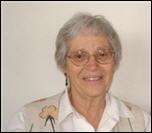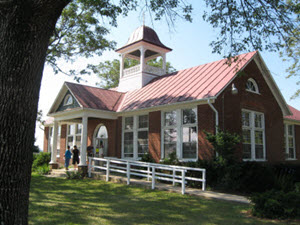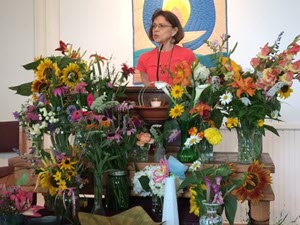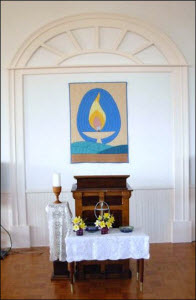
HUU Sermon Archives
That Still Small Voice: Can We Hear It?
by Beryl Lawson
July 27, 2003
 The
right of conscience and the use of the democratic process within our congregations
and society at large.
The
right of conscience and the use of the democratic process within our congregations
and society at large.
We would all agree that among the rights inherent in humanity would be the right of conscience, the right to act upon what we each think is best. But what is conscience? And can it be relied upon to lead us in the direction of correct action?
Conscience is referred to as that still small voice, the voice of god, the indwelling spirit the divine voice within each of us that tells us our actions are right or wrong. Quote Swami Shivananda: “Conscience is the light of the Soul that burns within the chambers of your heart. It is the little spark of celestial fire that makes know to you the presence of the Indweller, the author of the divine laws of truth.”
Perhaps each of us may call the source of our conscience different - perhaps God doesn’t want us to do something, perhaps our parents would be disappointed if we did thus and so, perhaps society would look askance at what we might do. We each have our own filter through which our inner voice works. But ultimately we come to the conclusion that conscience, if we will listen, will lead us to that which is best for more than just ourselves. Joseph Cook says “conscience is our magnetic compass: reason our chart.”
Is it possible to confuse conscience with desire? Something comes up. We don’t really feel like doing it. Is this our conscience speaking? Probably not. The way to decide might be to ask ourselves who will benefit if we don’t listen? W ho will be hurt? To listen to the voice of conscience is to admit that we are not alone in this world and that our actions do matter to the rest of life.
What happens when we don’t listen to that voice? The first time we decide to not listen our conscience will hurt, the next time we fail to listen it won’t hurt so much until finally we will have dulled that voice so that we will not hear it at all. Thus we have created our own monster.
It is suggested that the voice of conscience will lead to justice. To do the right thing by others, be they near or far, few or many, is to live by the dictates of our conscience and not by our personal desires. This is why a person sacrifices his comfort to help his neighbor. This is why we give up our favorite TV show to come to a meeting at HUU. This is why we give up a Saturday to cook and sell chicken, to mow the lawn, to work in a soup kitchen, to clean the church, to march for a just cause, to give our financial support to a worthy cause.
And then there is the whole question of the democratic process. So much talk today about creating democracies around the world. What is the democratic process and can it be imposed from the outside? Democracy comes from two Greek words demos’ people: and cratic control- therefore control by the people.
A small group of people rule themselves by often unspoken rules of conduct, perhaps come to by conscience- that which is best for the group will be best for me. As the groups get larger direct decision becomes more difficult. So what happens is groups become representative democracies, the group gives over the decision making process to a few whom they have chosen to represent them.
When HUU was very small we could all sit around a table and decide how we wanted to conduct meetings, raise funds, select speakers and so forth. As we grew we need ed to delegate these responsibilities to chosen ones, called the Board, to make these decisions for us. How could we be sure that the Board would do our wishes, and more importantly, not usurp the rights of us as individuals within the congregation? We have our principles to follow. We covenanted with each other that whatever was done in our name would be done in keeping with our seven UU principles. That was what made us a UU congregation and that was what would keep us on the straight and narrow. In other words, the seven principles became the conscience of the Board. In addition we made by-laws which helped direct the Board in the nitty gritty details of administering to the needs of the congregation.
And then we have congregational meetings in which the whole congregation gets to vote on how the Board is doing. If, for some reason we are unhappy with their performance what can we do? We can vote them out.
But what happens when the congregation becomes lazy and unwilling to keep an eye on the Board and see to it that they are adhering to our principles? Given selfish motive we can easily see how the Board could usurp our rights and gradually lead us into a dictatorship, even if we continued to call ourselves a democratic institution. And so it happens to nations. Can it happen to us here in America? We have seen much in recent months to indicate that such can and may already be happening. “It is human weakness that makes priestly domination possible.” H.P,Blavatsky
I like to believe that people in the long run are going to do more to promote peace than our governments. Indeed, I think that people want peace so much that one of these days governments had better get out of the way and let them have it. -Dwight D. Eisenhower, U.S. general and 34th president (1890-1969)
The death of democracy is not likely to be an assassination from ambush. It will be a slow extinction from apathy, indifference, and undernourishment. -Robert Maynard Hutchins, educator (1899-1977)
To announce that there must be no criticism of the President, or that we are to stand by the President, right or wrong, is not only unpatriotic and servile, but is morally treasonable to the American public. -Theodore Roosevelt, 26th US President (1858-1919)
When governments fear the people there is liberty. When the people fear the government there is tyranny. -Thomas Jefferson, third US president, architect and author (1743-1826)
The only sure bulwark of continuing liberty is a government strong enough to protect the interests of the people, and a people strong enough and well enough informed to maintain its sovereign control over its government. -Franklin D. Roosevelt, 32nd US President (1882-1945)
Are all people ready for democracy? And can it be imposed from without?
A family is not a democracy. The parents “dictate” to the children what they must do and can’t do. What happens in a family with wise parents? Gradually the parents allow the children to try their wings, make their own decisions, make their own mistakes, always guided by the principles that the parents have laid out for themselves to follow, until the time comes when the children are able to guide their own actions.
What happens if parents are not wise and try to keep telling the children what to do? Well, some children will remain children all their lives but some will rebel against the authoritarian rule of the parents and declare their independence. They will choose to make their own decisions.
What happens to the minority when majority rules? Is there a better way than the democratic process? How about consensus? Why it that so difficult to attain? And this brings us back to conscience. Unless people are willing to act justly and according to their conscience and not strictly by their desires, called in national parlance, our own national interest, all we get from an attempt at consensus is stalemate. Each one is out for him or her self and “ the devil take the hindmost.”
I had a dream a few weeks ago. Many facets as all dreams seem to have:: an accident, caring for wounded. Reporting to them news of their factions. The distrust of the factions. Each claiming to believe the same but each seeing it differently and hating the others for seeing it differently.
Trying to teach two girls to dance. Each had rhythm and style but each trying to do it without any basis in the rules. The rhythm of the dance. That was the hardest thing to do. To see that there is a basis or principle behind or within the dance. Until they were willing to give up their belief that theirs was the only way and the other way wrong, until they could come to a common understanding there could be no dance. In the end two very different monsters destroyed everything for both of them, their world was destroyed.
Although the principle discussing conscience and democracy may seem two ideas put together for convenience we can see that democracy cannot work without conscience. In our individual lives we call it that still small voice. In this group we call the ideals we try to live by our seven principles. In our country we call it our constitution and the bill of rights. It is conscience, our inherent sense of justice that, if we listen, will guide our lives for the better. And thus our congregation will be ruled not so much by what is written but by what we truly believe and try to live by in our daily lives. Our nation, and ultimately the world, will only come to true democracy when people are willing to live by that still small voice that tells us that we are all part of a community of life. What hurts one, hurts all. What benefits all, benefits each. It’s tough, but is there any other way to peace and justice in the world?
Read more sermons or talks by Beryl Lawson.
For the latest sermons and events at HUU, visit our Community Cafe.
Inclement
Weather Policy
Worship
Service Materials


UUs on YouTube
Our denomination has an official presence on YouTube! The Unitarian Universalist Association's YouTube site includes several videos and lots of interesting commentary.
Harrisonburg Unitarian Universalists 4101 Rawley Pike | Harrisonburg,
VA 22801
Mailing Address: | PO Box 96 | Harrisonburg, VA 22803
| (540) 867-0073 | Webmaster
HUU is a member of the Southern
Region of the Unitarian Universalist
Association
Privacy Policy &
Disclaimer
Site Design & Maintainence : Expression
Web Tutorials & Templates


